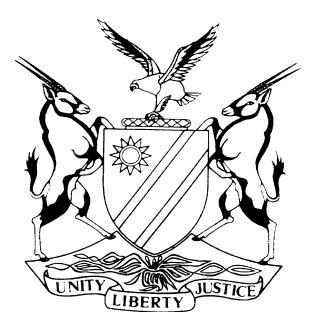NOT REPORTABLE REPORTABLE

HIGH COURT OF NAMIBIA MAIN DIVISION, WINDHOEK
JUDGMENT
CR No: 75/2018
In the matter between
THE STATE
v
BERNARDO MOISES
(HIGH COURT MD REVIEW CASE NO 1501/2018)
Neutral citation: S v Moises (CR 75/2018) [2018] NAHCMD 312 (28 September 2018)
CORAM: NDAUENDAPO J et LIEBENBERG J
DELIVERED: 28 September 2018
Flynote: Criminal Procedure – Guilty plea – Contravention of s 10(3) of the Immigration Control Act 7 of 1993 – Prerequisite of charge is a contravention of offences set out in sections 6, 7 or 8 – Court failed to establish whether any such offence committed – Conviction set aside.
ORDER
The conviction and sentence are set aside.
The matter is remitted to the trial court in terms of s 312(1) of Act 51 of 1977 with the direction to act in terms of s 113 and proceed to trial.
JUDGMENT
LIEBENBERG J: (Concurring NDAUENDAPO J)
[1 The accused appeared in the Rundu Magistrate’s Court, held at Mururani, on one count of contravening s 10(3) of the Immigration Control Act1 in that on 19 April 2018 he was found at Mururani check point without being in possession of a valid passport or document issued to him. He was convicted on a plea of guilty and sentenced to the maximum fine of N$20 000 or in default, five (5) years’ imprisonment.
[2] The matter is before me on automatic review in terms of s 302(1)(a) of the Criminal Procedure Act (the CPA).2 It is my considered opinion, and based on reasons to follow, that the accused, who has not paid the fine and is currently serving his sentence, is likely to be prejudiced if the record is not forthwith placed before this court. In view thereof I have declined to first obtain a statement from the presiding magistrate, as provided for in s 304(2)(a) of the CPA.
[3] During the court’s questioning of the unrepresented accused in term of s 112(1)(b), it emerged that, as the accused was passing through Mururani check point, he was accosted by a police officer who requested him to produce travelling documents. He produced a document which apparently did not authorise his stay in Namibia and was taken into custody. When questioned in court as to whether he was in possession of a valid passport or other document, he merely related to the document he had handed over to the police. The court however did not establish what the nature of the document was. On a question of the court as to when he entered into Namibia, he responded by saying that he arrived during 1981 in search of employment. On a follow-up question he admitted that he never tried to legalise his stay in Namibia. It is common cause that the accused is an Angolan citizen.
[4] Section 10(3) of Act 7 of 1993 reads as follows –
‘(3) If any person who enters or has entered Namibia in contravention of the provisions of section 6, 7 or 8 or, after having been refused permission to enter Namibia in terms of subsection (1) of this section, is found in Namibia, he or she shall be guilty of an offence and on conviction be liable to a fine not exceeding R20 000 or to imprisonment for a period not exceeding five years or to both such fine and such imprisonment, and may be dealt with under Part VI as a prohibited immigrant.’ (Emphasis provided)
Sections 6 regulates the entering of persons at ports of entry, while s 7 requires of these persons to report themselves to an immigration officer. Section 8 merely prescribes the powers of immigration officers in respect of persons presenting themselves at ports of entry.
[5] Section 10(3) makes plain that in order to have contravened the offence enacted therein, the accused must have entered Namibia in contravention of one of the offences set out in sections 6, 7 or 8. That is a prerequisite and a fact that triggers the application of s 10(3) of the Act.
[6] In the present instance it has not been established whether the accused made himself guilty of any of the offences described in sections 6, 7 or 8; neither what the nature of the document was he presented to the police officer when accosted at Mururani check point. All the accused said is that he has been living in Namibia since 1981. It is not alleged that he committed an offence by failing to legalise his continued stay in Namibia after independence.
[7] Whereas the court failed to establish these facts through its questioning, it could not have been satisfied that the accused was guilty of the offence charged. Accordingly, the conviction falls to be set aside. The onus is therefore on the State to prove the allegations contained in the charge.
[8] In the result, it is ordered –
The conviction and sentence are set aside.
The matter is remitted to the trial court in terms of s 312(1) of Act 51 of 1977 with the direction to act in terms of s 113 and proceed to trial.
___________________
J C LIEBENBERG
JUDGE
___________________
G N NDAUENDAPO
JUDGE
1 Act 7 of 1993 (the Act).